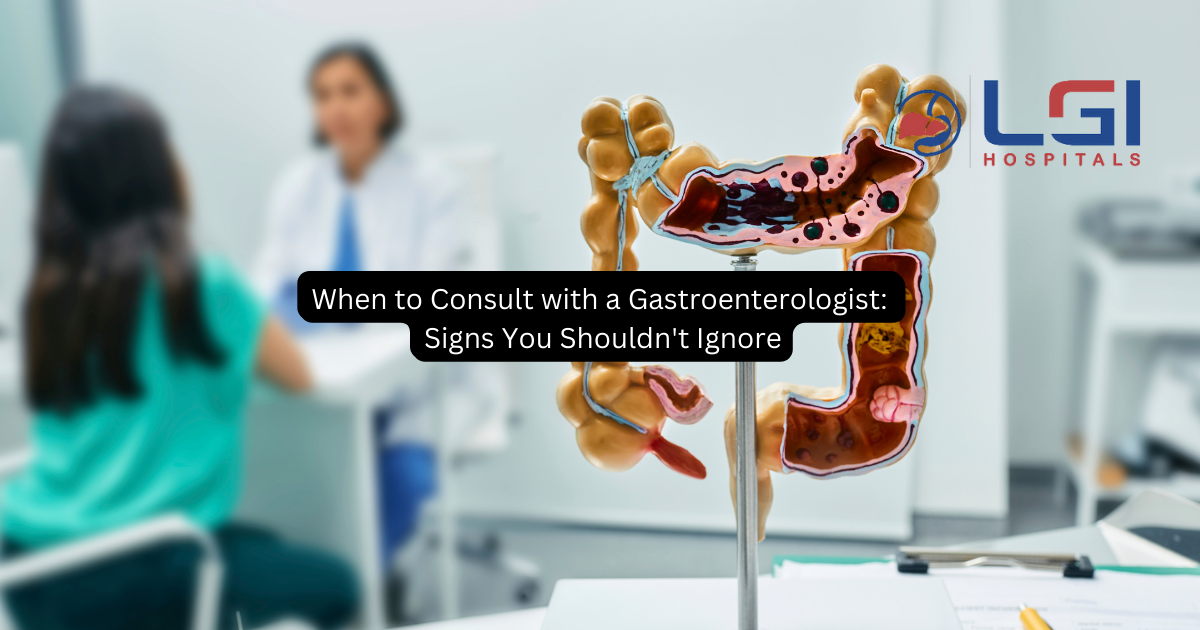The digestive system plays a vital role in our overall health and well-being. Issues in the gastrointestinal (GI) tract can significantly impact our daily lives and require medical attention. While some digestive problems can be managed with over-the-counter remedies or dietary changes, some sure signs and symptoms should prompt a visit to a gastroenterologist. This blog post will explore when to consult with a gastroenterologist and the conditions they can help diagnose and treat.
1. Persistent Abdominal Pain
Experiencing occasional stomach discomfort is relatively standard, but if you have persistent or recurrent abdominal pain, it may be a sign of an underlying gastrointestinal condition. Gastroenterologists are trained to identify the cause of abdominal pain, which can range from acid reflux, peptic ulcers, gallstones, or inflammatory bowel diseases like Crohn’s disease or ulcerative colitis. Consulting with a gastroenterologist can help determine the root cause of your pain and establish an appropriate treatment plan.
2. Frequent Heartburn or Acid Reflux
Occasional heartburn after a spicy meal is common, but if you experience frequent heartburn or acid reflux that affects your daily life, it may be time to see a gastroenterologist. Chronic acid reflux can lead to complications such as esophageal ulcers, strictures, or Barrett’s esophagus. Gastroenterologists can perform diagnostic tests like an upper endoscopy to evaluate the extent of the damage and recommend appropriate treatment options.
3. Difficulty Swallowing or Painful Swallowing
If you consistently experience difficulty or pain while swallowing, it may indicate an underlying issue with your esophagus. Gastroenterologists can perform tests like an upper endoscopy to assess the esophagus and identify conditions such as strictures, esophageal spasms, or eosinophilic esophagitis. Prompt evaluation by a gastroenterologist can help determine the cause and facilitate appropriate treatment.
4. Unexplained Weight Loss
Unintentional weight loss that occurs without changes in diet or exercise can cause concern. Gastrointestinal conditions such as celiac disease, inflammatory bowel disease, or even certain cancers can lead to unexplained weight loss. Consulting with a gastroenterologist can help identify the underlying cause and develop an appropriate management plan.
5. Changes in Bowel Habits
A gastroenterologist should evaluate any sudden or persistent changes in bowel habits. Symptoms such as chronic diarrhea, constipation, blood in the stool, or changes in stool color or consistency may indicate conditions like irritable bowel syndrome (IBS), inflammatory bowel disease (IBD), or colorectal cancer. Gastroenterologists can perform diagnostic tests like colonoscopy or stool tests to evaluate the condition and provide appropriate treatment.
6. Chronic Liver Diseases
If you have been diagnosed with a chronic liver disease, such as hepatitis B or C, cirrhosis, or fatty liver disease, it is crucial to consult with a gastroenterologist. These specialists can monitor your liver function, perform further tests to assess the severity of the disease, and recommend appropriate management strategies to prevent further liver damage.
7. Blood in Stool
Whether visible or detected through stool tests, blood in the stool should never be ignored. It can be a sign of various gastrointestinal conditions, including hemorrhoids, anal fissures, inflammatory bowel disease, diverticulosis, or even colorectal cancer. Consulting with a gastroenterologist is essential to determine the cause of the bleeding and develop an appropriate treatment plan.
8. Family History of Digestive Disorders
If you have a family history of gastrointestinal conditions, such as colon cancer, Crohn’s disease, or celiac disease, it is advisable to consult with a gastroenterologist. They can evaluate your risk factors, recommend appropriate screening tests, and provide guidance on preventive measures and early detection.
9. Refractory Digestive Symptoms
If you have been experiencing persistent digestive symptoms despite previous medical evaluations or treatments, it may be time to seek the expertise of a gastroenterologist. These specialists deeply understand gastrointestinal disorders’ complexities and can provide a fresh perspective, perform additional tests, and explore alternative treatment options.
10. Other Digestive Symptoms
If you experience any persistent or concerning digestive symptoms not mentioned above, it is always a good idea to consult a gastroenterologist. They are trained to evaluate various digestive disorders and can provide an accurate diagnosis and appropriate treatment plan based on your specific symptoms and medical history.
Screening and Preventive Care
Regular screening for certain gastrointestinal conditions is essential, even without symptoms. Gastroenterologists play a crucial role in performing screening tests like colonoscopies to detect colorectal cancer, which is highly treatable when caught early. Get your consultation done at LGI Hospitals, Nagpur. They can also guide other preventive measures, such as lifestyle modifications and vaccinations, to reduce the risk of hepatitis or other GI infections.
Knowing when to consult with a gastroenterologist is crucial for the timely diagnosis and treatment of digestive disorders. Suppose you experience persistent abdominal pain, frequent heartburn, difficulty swallowing, unexplained weight loss, changes in bowel habits, or have a family history of digestive disorders. In that case, it is advisable to make an appointment with a gastroenterologist. Remember, early intervention can lead to better outcomes and an improved quality of life. Don’t ignore your digestive symptoms – consult a gastroenterologist today at LGI Hospitals, Nagpur, and take charge of your gastrointestinal health.

